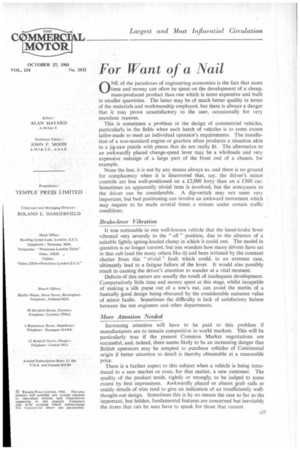No. 2932 For Want of a Nail O NE of
Page 29

If you've noticed an error in this article please click here to report it so we can fix it.
the paradoxes of engineering economics is the fact that more O NE of the paradoxes of engineering economics is the fact that more • time and money can often be spent on the development of a cheap, mass-produced product than one which is more expensive and built in smaller quantities. The latter may be of much better quality in terms of the materials and workmanship employed, but there is always a danger that it may prove unsatisfactory to the user, occasionally for very mundane reasons.
This is sometimes a problem in the design of commercial vehicles, particularly in the fields when each batch of vehicles is to some extent tailor-made to meet an individual operator's requirements. The installation of a non-standard engine or gearbox often produces a situation akin to a jig-saw puzzle with pieces that do not really fit. The alternative to an awkwardly placed change-speed lever may be a wholesale and very expensive redesign of a large part of the front end of a chassis, for example.
None the less, it is not by any means always so, and there is no ground for complacency when it is discovered that, say, the driver's minor controls are less well-positioned on a £2,000 lorry than on a £500 car. Sometimes an apparently trivial item is involved, but the annoyance to the driver can be considerable. A dip-switch may not seem very important, but bad positioning can involve an awkward movement which may require to be made several times a minute under certain traffic conditions.
Brake-lever Vibration
It was noticeable in one well-known vehicle that the hand-brake lever vibrated very severely in the " off " position, due to the absence of a suitable lightly spring-loaded clamp in which it could rest. The model in question is no longer current, but one wonders how many drivers have sat in that cab (and the many others like it) and been irritated by the constant chatter from this " trivial " fault which could, in an extreme case, ultimately lead to a fatigue failure of the lever. It would also possibly result in causing the driver's attention to wander at a vital moment.
Defects of this nature are usually the result of inadequate development. Comparatively little time and money spent at this stage, whilst incapable of making a silk purse out of a sow's ear, can avoid the merits of a basically good design being obscured by the considerable nuisance value of minor faults. Sometimes the difficulty is lack of satisfactory liaison between the test engineers and other departments.
More Attention Needed
Increasing attention will have to be paid to this problem if manufacturers are to remain competitive in world markets. This will be particularly true if the present Common Market negotiations are successful, and, indeed, there seems likely to be an increasing danger that British operators may be tempted to purchase vehicles of Continental origin if better attention to detail is thereby obtainable at a reasonable price.
There is a further aspect to this subject when a vehicle is being introduced to a new market or even, for that matter, a new customer. The quality of the product tends, rightly or wrongly, to be judged to some extent by first impressions. Awkwardly placed or absent grab rails or untidy details of trim tend to give an indication of an insufficiently wellthought-out design. Sometimes this is by no means the case so far as the important, but bidden, fundamental features are concerned but inevitably the items that can be seen have to speak for those that cannot.




















































































































